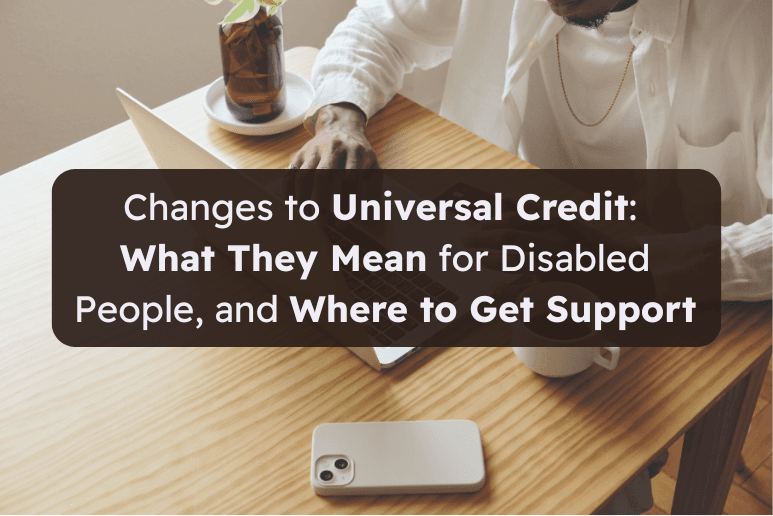All Articles
3 min read
Changes to Universal Credit: What They Mean for Disabled People, and Where to Get Support
Written by
Purpl
Published on
July 10, 2025

On 9 July 2025, Parliament approved changes to Universal Credit that will affect new applicants who have a disability or long-term health condition. If you’re trying to work out what it means for you or someone you know, here’s a simple breakdown of what’s changing, who it applies to, and where to turn for help if you need it.
What’s Changing?
At the moment, people who can’t work due to a health condition or disability may receive an extra payment as part of Universal Credit. This is known as the LCWRA element — short for Limited Capability for Work and Work-Related Activity — and it’s currently worth around £390 per month.
From April 2026, anyone newly applying for Universal Credit and assessed as having limited capability for work will receive a reduced amount — around £208 per month instead.
If you’re already receiving this support, your payments won’t change. You’ll continue to get the same amount, including annual increases in line with inflation.
The government has said this is part of a wider plan to simplify the benefits system and increase funding for employment support.
Who Will it Affect?
This change only applies to new claimants from April 2026 onwards. So if you’re already on Universal Credit and receiving the LCWRA element, you won’t be affected.
It’s expected that around 370,000 people could be impacted over the next few years. That includes people who may become too unwell to work or are newly diagnosed with long-term health conditions.
What About PIP?
Personal Independence Payment (PIP) isn’t affected by this change. It’s a separate benefit designed to help with the extra costs of living with a disability or health condition.
There are ongoing discussions about possible changes to the way PIP works in the future, but nothing has been decided yet. If anything changes, we’ll make sure you have access to clear, updated information.
What Support is Still Available?
If you’re disabled, chronically ill, or living with a long-term health condition, there are still ways to get support — both financial and practical.
Help with benefits and grants
- Turn2Us: Use their free tool to check what you might be entitled to and apply for grants
turn2us.org.uk - Citizens Advice: Get help with applying for benefits, understanding decisions, or managing money
citizensadvice.org.uk - Scope Disability Energy Support: Advice and help with your energy bills, equipment costs, and budgeting
scope.org.uk/energy - Benefits & Work: Guides to help with PIP and Universal Credit applications
benefitsandwork.co.uk
Save Money With Purpl
Living with a disability or health condition often comes with extra costs. That’s why Purpl partners with trusted brands to offer exclusive savings on everything from food and travel to days out, pet care, tech, and more.
Already a member? Login and browse all of our offers.
Not signed up yet? It only takes a minute, and members save over £700 per year on average. Join Purpl
Need Help Right Now?
If you’re feeling overwhelmed, there’s no shame in reaching out. Here are some places that offer free and confidential support:
Mental health and emotional support
- Mind
- Samaritans – Call 116 123, free 24/7
Money and debt advice
Staying Informed
These changes are significant, and we know it’s important to stay in the loop. We’ll continue to share clear updates, explainers, and useful tools as more information becomes available.
Whether these changes affect you now or sometime in the future, we’re here to help you feel informed, supported, and ready for whatever’s next.

Sammi is autistic, has ADHD, and lives with POTS. She’s passionate about disability advocacy, accessibility, and creating spaces where people feel seen, heard, and understood. With a sharp sense of humour and a deep love for community, she speaks openly about the realities of being neurodivergent across all of her personal platforms, always aiming to challenge stigma, spark conversations, and remind others they’re not alone.
Other articles you might like:
Welfare Reform Update: PIP Cuts Removed, But Universal Credit Reductions Still Stand
How to Challenge a PIP Decision in the UK: What to Do If Your Claim Is Refused or Underpaid
Disability Benefits Cuts – MPs Vote Result: What It Means, and What We Can Still Do
Over 100 Labour MPs Oppose PIP Cuts: What It Means and How You Can Take Action
